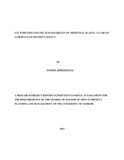| dc.description.abstract | Medicinal plants management strategies need to be understood and planned for based on an understanding of indigenous knowledge and practices. Many drugs contain herbal ingredients, and it has been said that 70–80% of the world's population relies on some form of non-conventional medicine. The most serious proximate threats when extracting medicinal plants generally are habitat loss, habitat degradation, and over harvesting. The information in this area was scanty and thus there was need for research which would be helpful to the area in developing measures to curb habitat deterioration leading to loss of medicinal plants. The primary focus of this study was to assess factors that influence sustainability of medicinal plants in the area of study. The objectives of study were: to examine socioeconomic factors affecting sustainability of medicinal plants, to assess environmental factors affecting medicinal plants and finally to establish management factors influencing medicinal plants in Laikipia East District. The study was conducted using a descriptive survey design and the target population was a sample of 50 herbalists from approximated 500 registered herbalists in the District, 50 herbal medicine users from the 500 households which had benefited from the services of 50 herbalists and 5 government officers from key Government departments such as; Agriculture, Public Health, Forest, Wildlife, and Social Services. Open and close ended questionnaires as well as interviews were used for collection of primary data. Quantitative data was analyzed by descriptive statistics using Statistical Packages for Social Sciences while qualitative data was analyzed using content analysis. This research led to shedding light on the utilization and management of medicinal plants, hence forming a foundation upon which effective access, utilization and corrective measures were generated. The study was also to help the communities, other researchers and relevant government ministries in the development of relevant mitigation measures in order to curb medicinal plants deterioration. Based on the findings the researcher recommended medicinal plants to managed and conserved in order continue serving as alternative medicine to community of Laikipa East District, there should be developed guidelines on the access and use. | en_US |

